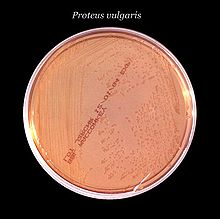Proteus vulgaris
| Proteus vulgaris | |
|---|---|
 |
|
| 24-hour-old culture | |
| Scientific classification | |
| Kingdom: | Bacteria |
| Phylum: | Proteobacteria |
| Class: | Gammaproteobacteria |
| Order: | Enterobacteriales |
| Family: | Enterobacteriaceae |
| Genus: | Proteus |
| Species: | P. vulgaris |
| Binomial name | |
|
Proteus vulgaris Hauser 1885 |
|
Proteus vulgaris is a rod-shaped, nitrate-reducing, indole+ and catalase-positive, hydrogen sulfide-producing, Gram-negative bacterium that inhabits the intestinal tracts of humans and animals. It can be found in soil, water, and fecal matter. It is grouped with the Enterobacteriaceae and is an opportunistic pathogen of humans. It is known to cause wound infections and other species of its genera are known to cause urinary tract infections.
The term Proteus signifies changeability of form, as personified in the Homeric poems in Proteus, "the old man of the sea", who tends the sealflocks of Poseidon and has the gift of endless transformation. The first use of the term “Proteus” in bacteriological nomenclature was made by Hauser (1885), who described under this term three types of organisms which he isolated from putrefied meat. One of the three species Hauser identified was Proteus vulgaris, so this organism has a long history in microbiology.
Over the past two decades, the genus Proteus, and in particular P. vulgaris, has undergone a number of major taxonomic revisions. In 1982, P. vulgaris was separated into three biogroups on the basis of indole production. Biogroup one was indole negative and represented a new species, P. penneri, while biogroups two and three remained together as P. vulgaris.
According to laboratory fermentation tests, P. vulgaris ferments glucose and amygdalin, but does not ferment mannitol or lactose. P. vulgaris also tests positive for the methyl red (mixed acid fermentation) test and is also an extremely motile organism.
When P. vulgaris is tested using the API 20E identification system it produces positive results for sulfur reduction, urease production, tryptophan deaminase production, indole production, sometimes positive gelatinase activity, and saccharose fermentation, and negative results for the remainder of the tests on the testing strip.
It is referenced in the Analytical Profile Index using the nine-digit code: 047602157.
The optimal growing conditions of this organism is in a facultative anaerobic environment with an average temperature of about 40 °C.
The Becton/Dickinson BBL Enterotube II system for identification of members of the family Enterobacteriaceae inoculated with P. vulgaris may yield the following results:
...
Wikipedia
